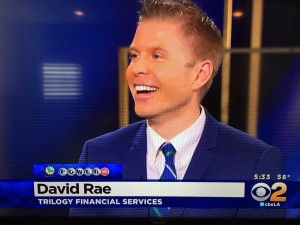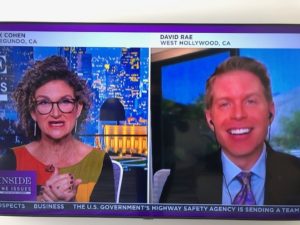
Safety in Numbers: What You Need to Know about Your Retirement Plan NOW.
A chance Uber POOL ride to the airport sparked a conversation about a Los Angeles doctor’s retirement plan that most definitely needs patching up. Step one is to run the numbers to make sure your retirement plan is actually realistic and not just a vague random goal of living well for the rest of your life.
By David Rae Certified Financial Planner™, Accredited Investment Fiduciary™
My doctor friends tell me that everywhere from parties to airplanes, to brunch at Cecconi’s, people are eager to question them about their symptoms. As a Certified Financial Planner, I’ve experienced something similar with random strangers keen to ask me about their money and investments once they find out what I do.
Last week, I shared an Uber POOL ride to the airport with a 40-something doctor who, within a second of hearing my profession, a fiduciary Certified Financial Planner, spent the rest of the trip explaining her investment philosophy. The gist of her financial plan: “Save enough . . . into risk-free investment X earning 3%.”
The doctor followed up with, “My husband and I don’t like to spend money and our expenses are very low.” But as she talked on, a few worrisome points came up that clouded her sunny assessment of their financial prowess. “But we have two young kids in private school, and both my husband (who has a PhD in mathematics) and I are paying off our student loans so it’s hard to save enough most of the time.”
Just a quick note, if you aren’t saving any money, your expenses are not likely very low.
The Known Unknowns of Retirement Planning
Under their circumstances, it is hard to save to be sure. And that’s not even counting the upcoming expense of funding two college educations back to back. But here is the part that shocked me. Despite the fact that her husband is a mathematician, they hadn’t run the numbers for how much they will need for retirement, let alone how much their current savings plan and investment strategy will grow by the time they get there. Between them, it still never occurred to them to see if their long term plan actually has any chance of working.
As we dropped my co-rider off at Southwest Airlines, I gave her a little piece of advice—to make sure your investment strategy will get you where you need to be, make sure to always run the numbers and adjust accordingly.
Her response was, “Do you not think my retirement plan will work?”
I said, “I have no idea. But I really love math, and money, so if for nothing else but peace of mind, it would be good to know if you are on track, or your plan has any possibility of working. From what you’re telling me, your risk-avoidance investment strategy will ensure the very outcome you are trying to avoid. You might not end up having enough of a nest egg to fully fund your retirement and the kind of life you want to lead once you stop working. But it’s only by seeing the numbers in black and white that you’ll know for sure.”
After she left the UBER driver chimed in, “She doesn’t have a chance in hell does she?”
The Doctor Is Out (on a Limb) – Take a Retirement Plan Now and call me in the morning
Some numbers can put this into perspective for you. I’ve met very few people in LA with children who are able to save anywhere near 50% of their GROSS income (that’s before taxes are taken out.) To “save enough” our Doctor would need to be in this crazy high rate of saving to have any chance of this plan working.
Let’s assume the good doctor started maxing 401(k) at 35. If she’s contributing the maximum allowed should get here pretty close to a secure retirement, right? If she earned 3% per year she would have about $945,000 at age 67. With a 3% return, she would be able to pull $2362 per month before taxes. And given that mathematics professors make less than medical doctors, even adding in Social Security means this couple’s standard of living will drop exponentially.
The brights spot here is the kids will hopefully be done with school by the time this couple hit full retirement age. Which in theory should help them lower their expenses.
Now if our doctor had a more appropriate portfolio and was able to average just 8% per year her 401(k) would grow to around $2,416,000. Assuming a 5% withdrawal rate she could receive around $10,000 per month before taxes. That’s more than FOUR TIMES the amount in her scenario above. Voila! the magic of compound interest and the possibility of leading achieving financial independence, and a comfortable golden years.
Just increasing your rate of return over time from 3% to 8% could increase this doctors retirement income by around 400%!!!!
See Here Now – Retirement Plan Now
In future posts, I’m going to be discussing how risky ‘risk-free’ investment can actually be along with some basics about compound interest and other issues.
Meanwhile, most of you reading this who do have a financial retirement plan (though the majority Americans, unfortunately, do not) believe it consists of naming a certain age where you intend to stop working, that’s it. That means that most people, whether with or without a plan, probably haven’t run the numbers either.
Subjectively, of course, I think working with a Fiduciary CFP® to help guide you through the retirement planning process is best. But whether you calculate these numbers yourself or get unbiased professional help to do it, the three numbers you need to know are:
- How much your current retirement accounts will grow to by the time you retire?
- Do you know how much income can you expect from that portfolio in retirement?
- How much do you expect you’ll need each month in retirement if you wish to maintain your current lifestyle? Then add 25% to that figure to cover unforeseen circumstances, inflation and other things you may have been left out.
This will help get you a ballpark figure of where you stand financially. Where are you now as versus where do you want to be? If there’s a disconnect, then it’s time to call in a professional Certified Financial Planner™ to put your money to work for you now and in the future.
Live for Today, Plan For Tomorrow.
DAVID RAE, CFP®, AIF® is a Los Angeles-based retirement planning specialist, a regular contributor to Advocate.com, Forbes.Com, Huffington Post and a financial advisor helping smart people across the USA.
Facebook (www.facebook.com/davidraecfp)
or via his website, www.davidraefp.com.

If you want to know more about your retirement plan now you may also enjoy:
What you need to know about Every type of Retirement Account NOW










[…] probably have trouble paying even the most basic necessities. But if you take the steps to follow a proper retirement plan you may able to accumulate a sufficient nest egg to keep many of the “wants” in your […]
[…] to your fiduciary financial planner and CPA to help narrow down which retirement plan will allow your business to contribute the most. These moves payoff now with tax breaks, and pay […]
[…] is the year to top off your retirement accounts and to benefit from the tax benefits they provide. You can contribute $6000 to a Traditional IRA […]